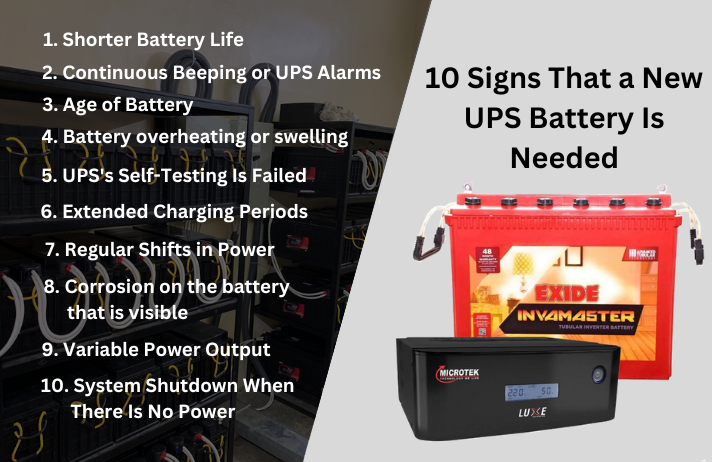Is your UPS acting up, or are you worried it might fail when you need it most? Knowing the warning signs of UPS battery failure can save you from unexpected power loss and costly damage to your devices.
You might notice strange noises, warning lights, or even physical changes to the battery itself—these are not problems to ignore. You’ll learn the key UPS battery failure symptoms to watch for, how to spot them early, and what you should do next.
Keep reading to protect your equipment and ensure your backup power is always ready when you need it.

Credit: www.donwil.com
Common Battery Issues
UPS batteries play a crucial role in keeping your devices powered during outages. Over time, these batteries can develop problems that affect their performance. Recognizing common battery issues helps prevent unexpected failures and protects your equipment. Here are some typical signs to watch for in UPS batteries.
Physical Damage Signs
Physical damage is a clear indicator of battery trouble. Look for cracks, dents, or broken terminals on the battery casing. Such damage can cause poor electrical connections or short circuits. Handling damaged batteries can be dangerous, so inspect them regularly for any visible harm.
Leaking And Discoloration
Leaking fluids from a battery are a serious warning sign. Acid or electrolyte leaks can damage nearby components and pose health risks. Discoloration on the battery surface, often caused by heat or chemical spills, signals internal damage. Replace any battery showing leaks or unusual stains immediately.
Swelling And Bulging
A swollen or bulging battery case means internal pressure is building up. This happens when gases form inside due to chemical reactions gone wrong. Swelling can lead to casing rupture or battery failure. Always replace batteries that appear swollen to avoid hazards and maintain UPS reliability.
Audible And Visual Alerts
UPS battery failure often triggers clear audible and visual alerts. These alerts help users identify problems quickly. Recognizing these signals prevents data loss and hardware damage. The UPS uses sounds and lights to communicate battery issues effectively. Understanding these alerts allows timely action and maintenance.
Beeping Sounds
Beeping sounds are the first warning of UPS battery failure. The UPS emits short, sharp beeps repeatedly. This alert signals a low or failing battery condition. Continuous beeping means the battery cannot hold a charge. Ignoring these sounds risks sudden power loss during outages. Listen carefully for any unusual or persistent beeping from your UPS.
Warning Lights And Symbols
UPS devices use warning lights and symbols to show battery health. A flashing amber or red light often indicates battery problems. Some UPS units display a battery icon with an exclamation mark. These visual alerts highlight issues like overheating or cell failure. Check your UPS manual to identify specific warning signals. Do not ignore these signs; they mean urgent battery attention is needed.
Performance Problems
Performance problems are common signs of UPS battery failure. These issues affect how long your UPS can support devices during a power outage. They also impact the stability of the power delivered. Recognizing these symptoms early helps prevent data loss and hardware damage.
Short Backup Time
A failing UPS battery often provides less backup time than usual. Your UPS may shut down quickly after a power cut. This happens because the battery cannot hold a full charge. Short backup time means your devices lose power sooner than expected. Monitoring backup duration helps detect battery health issues.
Unexpected Shutdowns
The UPS may turn off without warning during a blackout. Sudden shutdowns occur when the battery cannot supply consistent power. These unexpected stops can harm connected equipment. They also cause data loss if devices shut down improperly. Frequent shutdowns signal that the battery needs checking or replacement.
Inconsistent Power Delivery
A weak battery causes uneven power flow to your devices. This inconsistency can cause devices to restart or freeze. Fluctuating power stresses sensitive electronics and reduces their lifespan. UPS units should provide steady voltage during outages. Irregular power delivery indicates battery failure or other internal issues.

Credit: www.donwil.com
Causes Of Battery Failure
Batteries in UPS systems face several challenges that cause them to fail early. Understanding these causes helps protect your UPS and avoid unexpected downtime. Battery failure often results from improper charging, long idle periods, or harsh conditions. Each factor weakens the battery’s ability to hold a charge or deliver power.
Proper maintenance and correct charging cycles extend battery life. Ignoring these basics leads to reduced performance and sudden failures. Below are key causes of UPS battery failure.
Undercharging Effects
Undercharging happens when the battery does not get enough power to reach full charge. This causes sulfation, where lead sulfate crystals build up on battery plates. Sulfation reduces capacity and shortens battery life. Batteries kept undercharged lose their ability to deliver backup power reliably. Regular full charging is essential to avoid this damage.
Overcharging Risks
Overcharging means the battery receives too much voltage for a long time. This causes excessive heat and water loss inside the battery. Heat damages the internal components and causes the battery to swell or leak. Overcharging also speeds up corrosion of battery plates. Using a quality charger with voltage regulation prevents these risks.
Long Storage Without Use
Storing batteries without using or charging them for months causes self-discharge. The battery gradually loses its charge and becomes deeply discharged. Deep discharge leads to irreversible damage and capacity loss. Storing batteries in a charged state and recharging them regularly keeps them healthy. Avoid leaving batteries unused for long periods.
Battery Lifespan Factors
The lifespan of a UPS battery depends on several key factors. Understanding these helps predict when a battery might fail. Proper care extends battery life and ensures reliable power backup.
Age And Usage Impact
Batteries have a limited lifespan, usually 3 to 5 years. Over time, chemical reactions reduce their ability to hold charge. Frequent use or long discharge periods shorten battery life. Old batteries may fail suddenly without warning.
Environmental Influences
Temperature plays a big role in battery health. High heat speeds up battery aging and causes damage. Cold temperatures reduce battery capacity temporarily but cause less permanent damage. Humidity and dust can also affect battery performance.
Maintenance Importance
Regular checks keep batteries in good condition. Cleaning terminals prevents corrosion and poor connections. Testing battery voltage and charge levels detects problems early. Replacing batteries before they fail avoids unexpected power loss.

Credit: www.perfectupsbattery.com
Replacement Indicators
Replacement indicators help identify when a UPS battery no longer performs well. Recognizing these signs early prevents unexpected power loss. It also protects connected devices from damage. Simple checks can tell if the battery needs replacing.
When To Replace Batteries
Look for warning signs like frequent alarms or error messages. Physical damage such as bulging, cracks, or leakage signals failure. If battery run-time drops significantly, replacement is needed. Age matters; most UPS batteries last 3 to 5 years. Regular testing can reveal capacity loss before complete failure.
Choosing Between Replacement And New Ups
Consider the UPS age before deciding. A battery replacement suits units less than five years old. Older UPS systems may need a full replacement for better reliability. Costs of new batteries versus a new UPS affect the choice. New UPS models offer improved features and efficiency. Balance budget with long-term power protection needs.
Safety Concerns
UPS battery failure poses serious safety concerns beyond just power loss. Faulty batteries can release harmful acids and spark dangerous fires. Understanding these risks helps protect you and your equipment. Always treat UPS battery issues with caution and care.
Handling Acid Leaks
UPS batteries contain corrosive acid that can leak if damaged. Acid leaks can burn skin, damage surfaces, and harm the environment. Avoid touching leaked acid with bare hands. Use gloves and protective eyewear when cleaning. Neutralize spills with baking soda before wiping. Proper disposal of damaged batteries prevents further hazards. Immediate action reduces health risks and equipment damage.
Fire And Explosion Risks
Failing UPS batteries may overheat and cause fires. Internal short circuits or physical damage increase explosion risks. Keep batteries away from heat sources and flammable materials. Never attempt to repair swollen or leaking batteries. Use only manufacturer-approved replacements. Smoke or unusual smells from batteries require prompt disconnection. Early detection of these signs prevents serious accidents.
Frequently Asked Questions
How Do I Know If My Ups Battery Is Bad?
Check for UPS battery swelling, leaks, or corrosion. Listen for frequent beeping or warning lights. Short runtime also signals failure.
What Happens When An Ups Battery Fails?
A failed UPS battery causes power loss during outages, triggers warning alarms, and may damage connected devices. Replace it promptly to ensure protection.
What Is The Leading Cause Of Ups Failure?
The leading cause of UPS failure is battery failure due to aging, undercharging, overcharging, or prolonged storage without recharging.
Is It Worth Replacing An Ups Battery?
Replacing a UPS battery is worth it if the battery is damaged or the UPS is less than five years old. Otherwise, consider buying a new UPS.
What Are Common Signs Of Ups Battery Failure?
Common signs include beeping sounds, amber warning lights, and sudden power loss during outages.
Conclusion
Recognizing UPS battery failure symptoms helps prevent sudden power loss. Watch for warning signs like beeping sounds, warning lights, or physical damage. Timely battery checks keep your UPS running smoothly. Regular maintenance extends battery life and protects your devices. Stay alert to avoid costly repairs or data loss.
Taking action early ensures reliable backup power when needed most.
